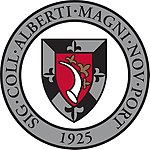Loading AI tools
Catholic liberal arts college in New Haven, Connecticut, US From Wikipedia, the free encyclopedia
Albertus Magnus College is a private Roman Catholic university in New Haven, Connecticut, United States. It was founded in 1925 by the Dominican Sisters of St. Mary of the Springs (now Dominican Sisters of Peace). Its campus is in the Prospect Hill neighborhood of New Haven, near the border with Hamden.
This article may rely excessively on sources too closely associated with the subject, potentially preventing the article from being verifiable and neutral. (June 2018) |
 | |
| Latin: Collegium Alberti Magni | |
| Type | Private university |
|---|---|
| Established | July 13, 1925 |
Religious affiliation | Roman Catholic (Dominican Sisters of Peace) |
Academic affiliations | ACCU CIC NAICU |
| President | Marc M. Camille |
| Undergraduates | 1,200 full-time |
| Postgraduates | 270 full-time |
| Location | , , U.S. |
| Campus | 50 acres (200,000 m2) |
| Colors | Blue and white |
| Nickname | Falcons |
Sporting affiliations | NCAA Division III – GNAC, ECAC |
| Website | albertus |

Albertus Magnus College was founded in 1925 by the Dominican Sisters of St. Mary of the Springs. The dedication speaker was James Rowland Angell, the president of nearby Yale University. All classes and offices were first housed in Rosary Hall, a Palladian-style mansion that has since been converted for use as the institution's main library. The college's first chaplain, Rev. Artur Chandler, stated that the college's initial goal was to educate women "to become thinkers and leaders and the noble among the ladyhood of the future."[1]
By 1940 the campus had expanded to its current 50 acre size and absorbed a variety of surrounding gilded-era mansions for use as dormitories and office space. The school became known for its strict liberal arts curriculum that required four years of Latin or Greek study.
Originally a women's college, the institution became coeducational in 1985 to some controversy, led by its longtime president Julia M. McNamara.[1] Albertus Magnus College was the last Connecticut college to go co-ed. The 1980s also brought a series of construction projects to the campus, including new classroom space and a new athletic center. The first graduate program, a Master of Arts in Liberal Studies, was offered in 1992.


Albertus Magnus is presided over by a board of trustees. A 1968 reorganization of this leadership opened 80% of spots to secular personnel while continuing to reserve 20% for members of the Dominican Sisters of Peace.
In addition to undergraduate majors, minors and concentrations, including pre-professional preparation, there are graduate programs in art therapy, mental health counseling, addiction counseling, leadership, liberal studies, fine arts in creative writing, human services, business administration, education, instructional design, management and organizational leadership.
As of 2022, the university has a 100% acceptance rate with a student body that is 15% male and 85% female.[2]

The campus is located about two miles (2 km) from the central campus of Yale University in a residential area known as Prospect Hill near the border with Hamden. The neighborhood is on Prospect Street just above Edgerton Park and near East Rock.
The institution uses several of the area's historic 19th century mansions as residence hall and administrative building. A number of these are contributing properties of the Prospect Hill Historic District.
Albertus Magnus College teams participate as a member of the National Collegiate Athletic Association's Division III. The Falcons are a member of the Great Northeast Athletic Conference (GNC). Men's sports include baseball, basketball, golf, ice hockey, soccer, tennis and swimming & diving; while women's sports include basketball, field hockey, lacrosse, soccer, softball, ice hockey, swimming & diving, tennis and volleyball.
Seamless Wikipedia browsing. On steroids.
Every time you click a link to Wikipedia, Wiktionary or Wikiquote in your browser's search results, it will show the modern Wikiwand interface.
Wikiwand extension is a five stars, simple, with minimum permission required to keep your browsing private, safe and transparent.